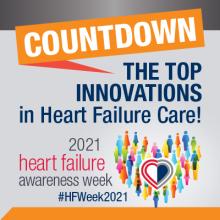
This post was developed as part of the Heart Failure Awareness Week 2021 Heart Failure Top Innovations Countdown.
Submitted by Melissa Owen PhD, RN, CNE, FHFSA, Associate Clinical Professor, Assistant Dean for Pre-Licensure Programs, Nell Hodgson Woodruff School of Nursing @DrMelissaOwen
“It’s about how you live” ~ The National Hospice and Palliative Care Association
In heart failure, patients experience many physical symptoms like shortness of breath, swelling, and feeling tired. They may also feel sad, depressed, or anxious. Their family and caregivers may not know how to help them, and may feel their own stress or sadness related to caring for their loved ones and changes in the family structure or relationships. Patients may have trouble expressing their feelings or questions about care especially as it relates to life saving measures such as a ventilator, CPR, or other therapies. The patient with heart failure may eventually find themselves in a situation where they cannot make their own decisions. Families and caregivers may not know what the patient’s wishes and goals are or how to communicate these to the healthcare provider. The healthcare provider and family must then try to decide how to plan the best care for the patient.
Now imagine if there was a therapy available that could help patients and families living with heart failure. A therapy that focuses on managing symptoms and improving quality of life, while still pursuing all treatment options for heart failure. A therapy that can help provide holistic assessment and care to patients for not only physical symptoms, but emotional symptoms, spiritual distress, and social aspects of care. A therapy that helps patients and families communicate with their healthcare providers about care decisions that may need to be made in the future while the patient can still make those decisions.
This therapy actually already exists in the form of Palliative Care. Palliative Care (which may also be known as Supportive Care) is a holistic, patient and family centered approach to care that focuses on symptom and stress relief for patients with chronic diseases like heart failure. Most importantly, Palliative Care is for all patients including those who are still pursuing treatment for their heart failure including heart transplant or ventricular assist device (VAD) therapies. Sometimes Palliative Care is confused with or used to mean the same thing as hospice care. In the United States, hospice care is used for patients who are in end stages of the disease and have a life expectancy of less than 6 months. Palliative Care, on the other hand can be used throughout the illness journey even from the beginning at diagnosis. There is research that has been done on the benefits of Palliative Care for patients with heart failure. These studies show that patients who receive Palliative Care have better quality of life, less depression, less anxiety, and less physical symptoms.
Palliative care starts with asking about the patient’s symptoms and helping the patient to identify what their goals are while living with heart failure. Sometimes it may be the primary care provider or the cardiology provider who provides Palliative Care for the patient. Other times, the patient may see a provider who has special training in Palliative Care, depending on their needs. As the patient gets sicker, symptoms such as shortness of breath or swelling may get worse. The healthcare provider can talk about how to make these better and may ask the patient more often about their symptoms. The healthcare provider may also ask about an “Advance Directive,” a document that says what the patient wants in terms of medical care if they can no longer make their own decisions. For example, do they want to be put on a machine that helps them breathe ( a ventilator)? Do they want dialysis if their kidneys stop working? Who do they want to make these decisions for them? Having conversations with the patient and family while the patient is well can help make these decisions easier if needed. The patient still makes decisions even if they have an Advance Directive as long as they are able to. The patient’s choices may change over time as the patient get more sick, so talking about what the patient wants often is helpful.
If your provider brings up palliative care, be open to having the talk. This does not mean there is no hope left or that there is nothing else that can be done for your heart failure. Your provider is trying to help you live your best life while treating your heart failure. If your provider does not bring up palliative care, ask about it. Important questions such as “what else can be done for my symptoms’ or “do you know what I want for medical care if I cannot tell you?” are good places to start. Finally, talk to your family about your wishes, and write them down. Remember, “it’s about how you live.”
Disclaimer: The statements and views expressed in this post are those of the author and do not necessarily reflect the opinions or recommendations of the Heart Failure Society of America. Furthermore, HFSA does not endorse any medications or treatments discussed herein.
